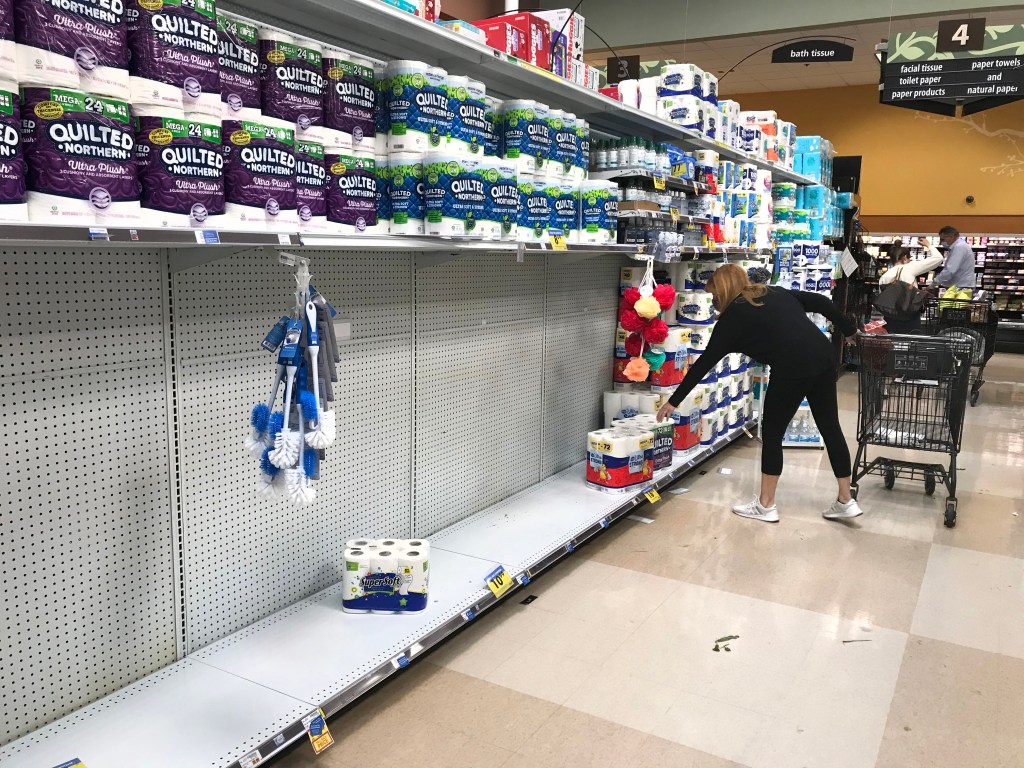- Chapters
- descriptions off, selected
- captions settings, opens captions settings dialog
- captions off, selected
This is a modal window.
Beginning of dialog window. Escape will cancel and close the window.
End of dialog window.
This is a modal window. This modal can be closed by pressing the Escape key or activating the close button.
This is a modal window. This modal can be closed by pressing the Escape key or activating the close button.
Americans needlessly panic-buying toilet paper, but real port strike shortages loom
By Craig Nigrelli (Reporter), Alex Delia (Producer), Jake Maslo (Video Editor)
Ongoing port strikes along the East Coast and Gulf of Mexico are causing widespread consumer panic, resulting in empty shelves at stores across the country. While toilet paper shortages have sparked alarm, experts say consumers may be focusing on the wrong products, with the real threat lying in the disruption of more perishable goods, particularly bananas.
Media Landscape
See how news outlets across the political spectrum are covering this story. Learn moreBias Distribution
Left
Untracked Bias

Nearly 90% of the U.S. toilet paper supply is produced domestically or imported from Canada and Mexico by rail, bypassing the ports affected by the strikes.
Despite fears of a repeat of the 2020 shortages, paper supply chains remain stable, and panic buying is unlikely to have a lasting impact.

Download the SAN app today to stay up-to-date with Unbiased. Straight Facts™.
Point phone camera here
The true disruption, however, is to the supply of bananas. Nearly 100% of the bananas consumed in the U.S. are imported, with more than half passing through the ports currently paralyzed by the strike. Wilmington, Delaware, a major entry point for over 25% of the nation’s bananas, is one of the most affected.
In 2023, the U.S. imported over 11 billion pounds of bananas, making the fruit a staple in American households.
Due to their low value and highly perishable nature, bananas cannot be stockpiled in advance. As the strikes continue, grocery stores may soon face a shortage of bananas, with limited options to source replacements quickly.
President Joe Biden has called on both sides to reach a fair agreement but has stopped short of invoking the Taft-Hartley Act, which would impose an 80-day cooling-off period on strikes that threaten national health and safety.
As the negotiations drag on, analysts estimate the economic impact of the strikes could range from $500 million to $5 billion per day.
CRAIG NIGRELLI: THE ONGOING U-S PORT STRIKES ALONG THE EAST COAST AND GULF OF MEXICO ARE CAUSING PANIC AMONG CONSUMERS, LEADING TO EMPTY SHELVES IN MANY STORES. BUT IT TURNS OUT… PEOPLE MAY BE PANICKING ABOUT THE WRONG PRODUCTS.
TOILET PAPER SHORTAGES ARE BEING REPORTED ALONG THE EAST COAST… INCLUDING COSTCO AND WALMART STORES IN NEW JERSEY
DESPITE THESE REPORTS, THE STRIKES ARE NOT AFFECTING THE SUPPLY OF PAPER PRODUCTS. IN FACT… AROUND 90-PERCENT OF THE U-S TOILET PAPER SUPPLY COMES FROM DOMESTIC FACTORIES OR IS TRANSPORTED FROM CANADA AND MEXICO BY RAIL, MEANING THESE PRODUCTS ARE NOT DIRECTLY IMPACTED BY THE STRIKES. THIS PANIC BUYING, FUELED BY FEAR AND MEMORIES OF THE 2020 SHORTAGES, IS NOT LIKELY TO HAVE ANY EFFECT ON PAPER SUPPLY CHAINS.
HOWEVER… THE STRIKES ARE IMPEDING THE SUPPLY CHAIN OF A MORE VITAL IMPORT. ALMOST 100% OF THE BANANAS CONSUMED IN THE U-S ARE IMPORTED, AND MORE THAN HALF OF THOSE IMPORTS COME THROUGH THE PORTS NOW AFFECTED BY THE STRIKE. ONE KEY ENTRY POINT IN WILMINGTON, DELAWARE HANDLES OVER 25-PERCENT OF THE COUNTRY’S BANANAS. IN 2023… THE U-S IMPORTED OVER 11 BILLION POUNDS.
WITH BANANAS BEING LOW-VALUE AND HIGHLY PERISHABLE… LASTING JUST A FEW WEEKS FROM TREE TO TABLE… IT’S IMPOSSIBLE TO STOCKPILE THEM AHEAD OF TIME. AS THE STRIKE DRAGS ON, WE’RE LIKELY TO SEE A SHORTAGE OF BANANAS IN GROCERY STORES ACROSS THE COUNTRY.
PRESIDENT BIDEN IS URGING BOTH SIDES TO COME TO A FAIR AGREEMENT… HE DECLINED TO INVOKE THE TAFT-HARTLEY ACT AT THIS TIME, WHICH GRANTS AN 80-DAY COOLING PERIOD ON STRIKES THAT AFFECT NATIONAL HEALTH AND SAFETY.
AS THE STRIKES CONTINUE… ANALYSTS PROJECT A WIDE SPECTRUM OF ESTIMATES ON THE TOTAL ECONOMIC IMPACT… RANGING FROM 500 MILLION UP TO 5 BILLION DOLLARS A DAY.
FOR MORE UNBIASED UPDATES AND STRAIGHT FACTS… DOWNLOAD THE STRAIGHT ARROW NEWS APP OR VISIT SAN DOT COM.
FOR STRAIGHT ARROW NEWS… I’M CRAIG NIGRELLI.
Media Landscape
See how news outlets across the political spectrum are covering this story. Learn moreBias Distribution
Left
Untracked Bias
Straight to your inbox.
By entering your email, you agree to the Terms & Conditions and acknowledge the Privacy Policy.
MOST POPULAR
-
 RICHARD PIERRIN/AFP via Getty Images
RICHARD PIERRIN/AFP via Getty Images
Haiti’s capital could fall to armed gangs at any moment: Report
Watch 2:0619 hrs ago -
 IAF
IAF
Israel first to go ‘Beast Mode’ with F-35 fighter in combat
Watch 2:0519 hrs ago -
 Drew Angerer/Getty Images
Drew Angerer/Getty Images
Hunter Biden’s ex-business partner reveals ‘pardon’ conversation with Trump
Watch 2:2219 hrs ago -
 Artur Widak/NurPhoto via Getty Images
Artur Widak/NurPhoto via Getty Images
Canada updates travel guidance for residents heading to US
Watch 2:2020 hrs ago




